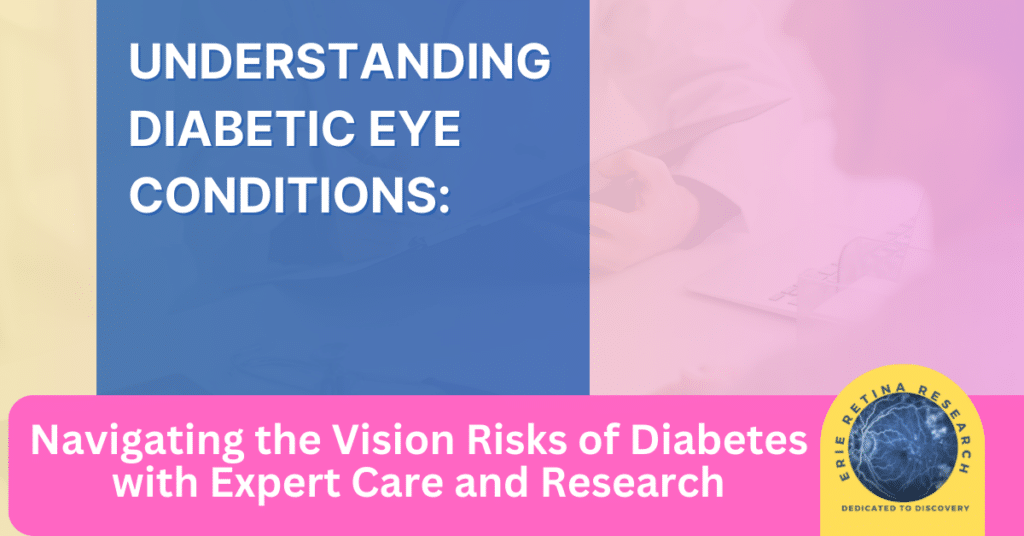
Navigating the Vision Risks of Diabetes with Expert Care and Research
Diabetes is not just a blood sugar issue—it’s a complex condition that can affect your entire body, including your eyes. At Erie Retina Research, we are deeply committed to helping our community understand and manage diabetic eye conditions through advanced treatment options and clinical research. Our goal is to protect your vision through education, preventive care, and innovative therapies. Here’s a detailed look at diabetic eye diseases, with a special focus on diabetic retinopathy and diabetic macular edema (DME).
Diabetic Retinopathy: The Leading Cause of Blindness in Adults
Diabetic retinopathy occurs when high blood sugar levels damage the tiny blood vessels in the retina, the light-sensitive lining at the back of the eye. This damage can cause the vessels to leak fluid or bleed, leading to distorted vision and, if untreated, can result in blindness. Interestingly, diabetic retinopathy can develop in anyone with type 1 or type 2 diabetes, and the risk increases the longer you have diabetes and the less controlled your blood sugar is.
Early stages of diabetic retinopathy often have no symptoms, which is why regular eye exams are crucial. As the condition progresses, you may notice symptoms like an increase in floaters, blurred vision, dark areas of vision, and difficulty perceiving colors. Advanced stages can lead to diabetic macular edema, where fluid accumulates in the macula—the part of the retina responsible for sharp, straight-ahead vision.

Diabetic Macular Edema (DME): A Major Complication
Diabetic macular edema, which can occur at any stage of diabetic retinopathy, involves swelling in the macula due to leaking fluid from damaged blood vessels. It is particularly concerning because it can develop without any noticeable loss of vision. However, as DME progresses, it can cause significant vision loss and is the most frequent cause of vision impairment in people with diabetes.
Fascinatingly, not everyone with diabetic retinopathy develops DME, but approximately half of those with a 20-year history of diabetes will develop this serious complication. Regular monitoring for those with diabetic retinopathy can help catch DME early when it is most treatable.
The Power of Clinical Research Studies
At Erie Retina Research, we also provide patients the unique opportunity to participate in clinical research studies, which offer access to new therapies that might not yet be available to the public. These studies are crucial for the advancement of medical knowledge and treatment practices. Participating in a clinical trial can be highly cost-effective, as patients often receive study-related care at no cost, including exams and treatments.
Why Consider a Clinical Trial?
Clinical trials are an excellent way to receive the most advanced care available. They are also a way to contribute to the larger diabetes community by helping researchers find better ways to manage diabetic eye conditions. Participation is typically free and includes detailed, potentially frequent health checks.

Healthy Eating Tips for Diabetics
Managing diabetes effectively involves more than just monitoring blood sugar levels; it also requires a balanced diet that supports overall health, including eye health. Here are some practical healthy eating tips that can help manage diabetes and reduce the risk of developing diabetic eye conditions:
- Incorporate Nutrient-Rich Foods: Focus on a diet rich in fruits, vegetables, whole grains, and lean proteins. These foods are low in fat and calories and high in essential nutrients that can help maintain general health and slow the progression of diabetic retinopathy.
- Choose Healthy Fats: Incorporate sources of omega-3 fatty acids, such as fish (like salmon and mackerel), flaxseeds, and walnuts. Omega-3s are known to support retinal health and may help prevent retinopathy.
- Manage Portion Sizes: Keeping portion sizes in check can help control blood sugar levels, reduce calorie intake, and maintain a healthy weight, all of which are crucial for managing diabetes.
- Stay Hydrated: Drinking plenty of water throughout the day helps maintain hydration and overall health, which is beneficial for maintaining the health of your eyes.
- Limit Sugary and Processed Foods: Reducing the intake of sugary and highly processed foods can help control blood sugar spikes and contribute to overall diabetes management.
By integrating these dietary practices, individuals with diabetes can not only manage their condition more effectively but also potentially reduce the risk of eye complications associated with diabetes. Eating well is a powerful tool in the fight against diabetes and its long-term complications.
Join Our Clinical Research Studies
If you’re interested in participating in one of our research studies or want more information on managing diabetic eye conditions, visit our website at www.erieretinaresearch.com or call us at 814-200-9152. At Erie Retina Research, we’re dedicated to helping you preserve your vision through cutting-edge research and comprehensive care.
For more information or to schedule an eye exam, please contact us. Together, we can work towards maintaining your eye health and vision, even in the face of diabetes.








